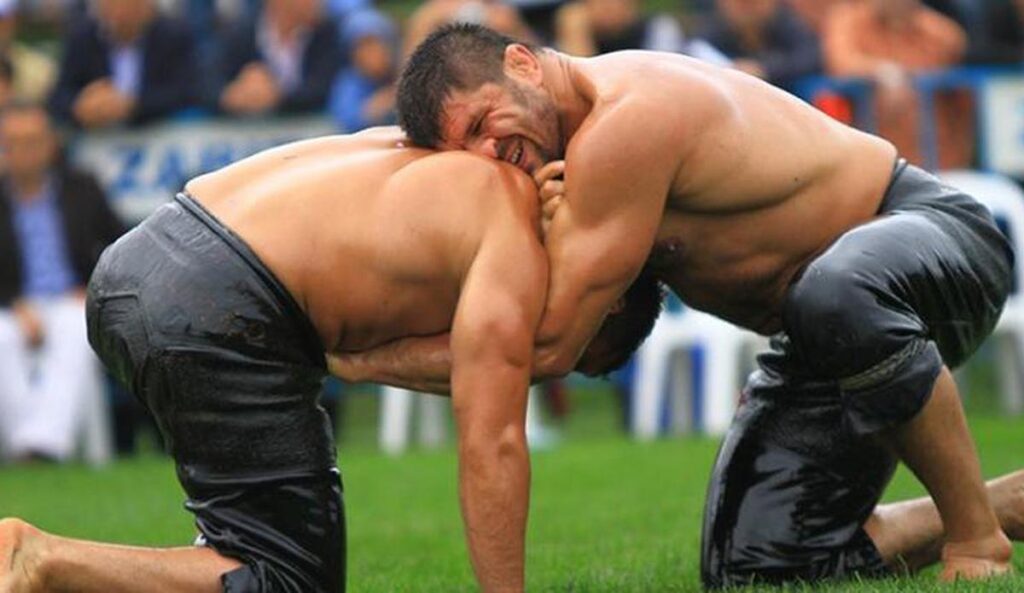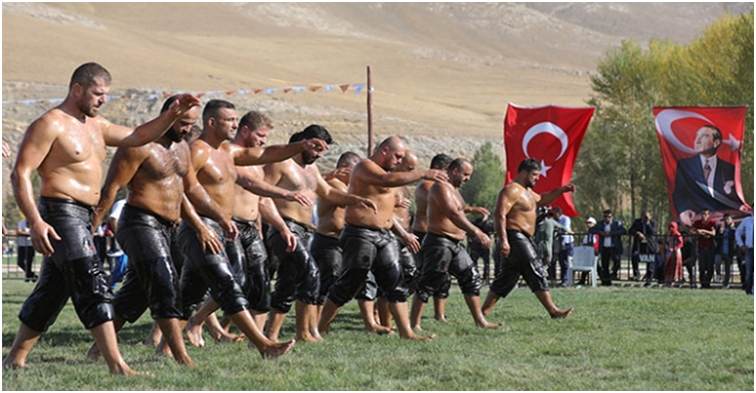Introduction
Oil Wrestling is one of the most popular sports in Turkey. Yagli gures means literally oiled wrestling. The wrestlers wear tight short leather trousers called “Kispet”, made of water buffalo leather weighing approximately 13 kilograms (29 pounds), and they cover themselves with olive oil. Matches take place throughout the country but the most famous and most important tournament takes place in Edirne by the end of June and beginning of July, or at the end of July, every year. In 2019 the wrestler Mr. Ali Gurbuz won the final match of the 658th edition and holds the title of “bas pehlivan”. In 2020 the matches of the 659th edition will be held between 29 June – 5 July. It’s a big fair as well with music and celebrations and it goes on until the morning. Usually lamb roast is a very popular food. In the entertainments, belly dancing is accompanied by Turkish traditional musical instruments ‘davul’ (drum) and ‘zurna’ (a type of flute) and singings.

The History of Oil Wrestling
The history of the oil wrestling tournaments links back to the Persian Era, a period starting from 1065 BC according to Ferdowsi’s Shahnameh. The legendary pehlivan (wrestler) of this era is Rostam, constantly saving his country from the evil forces. The word “Pehlivan” for a wrestler was first used in the period when the Parthian (238 BC – 224 AD) expelled the Greeks from Iran. From this period we can trace the basic rules. During the period Islam was brought into Asia Minor, spirituality and philosophy became part of the physical garment of the pehlivan. Turkish Oil wrestling style became established as a sport on its own during a campaign launched by Ottoman sultan Orhan Gazi to capture Rumeli (Thrace) – the European side of Turkey’s Marmara region. In that time the sultan and his brother, Süleyman Pasha and 40 warriors captured forts in the region of what is now the Greek / Turkish / Bulgarian border. On the place they camped, they started wrestling for fun. Two of them wrestled for hours but neither managed to win. Süleyman Pasha promised the winner a leather pant (kispet) when they would continue their match during the annual Spring festival (May 6), held in Ahirköy. They wrestled from morning till midnight, became exhausted and both died. Their friends buried them under a fig tree and left. When the soldiers visited the burial site years later, they noticed that several springs had sprung up on the site and named the place Kirkpinar (Forty Springs). In time, they started to organize oil wrestling tournaments and the sport became a tradition in Edirne province. This city was the capital of the Ottoman Empire for 91 years and is every year the place of the tournament.

The Ottoman sultans and elite were actively involved in organizing wrestling competitions. Virtually every village, town and city had its champion. It was these local champions who would gather in Kirkpinar to compete, though for much of its history the Kirkpinar competition itself was a local affair. It has been suggested that the Ottomans built a specific lodge for training wrestlers in every town that they conquered, from the Balkans to North Africa and even in Makkah. Matches were often organized on Fridays or as part of ‘Īd celebrations. Wrestlers were invited from across the empire and even beyond it, including some Africans and Indians. Sultans often sponsored the most impressive of these athletes; Süleyman (r. 1520-66) paid his favourite wrestlers a daily wage. Some sultans went a step further and became wrestlers themselves. The best example of this is Murad IV (r. 1612-40). Murad frequently stripped down and wrestled his court officials, including his calligrapher (who was, of course, a great wrester himself). There are amusing incidents in which a court servant gave Murad the advice that, since he had already taken a bath and must be exhausted at the end of a long day anyway, he shouldn’t oil himself for wrestling; Murad responded to the servant’s “trash-talking” about the sultan’s exhaustion by lifting him up in the air and spinning him around until he pleaded to be let down. Murad let him down, laughed, and rewarded him with gold coins.
More Culture than Sport?
The cultural importance of the sport is such that the Kirkpinar tournament is listed by UNESCO as part of humanity’s “Intangible Cultural Heritage.” The unofficial national sport of Turkey, with the added status of being an “ancestor sport,” wrestling is lauded as a pure Anatolian pursuit, which distinguishes Turkey in the region (Greece is the only country to pursue oil wrestling in any similar fashion). Furthermore, as it has been practically unchanged for centuries, the sport represents an important link to the past in a period when Turkish politics has veered back to an adulation of Turkey’s glorious history, rather than its Republican promise. Aside from its official status, the prominence of oil wrestling in Turkish culture is hardly surprising given the values it represents. Above all, the sport is an overt display of masculine strength and physical prowess, which, given Turkey’s obsession with masculinity (even in judicial settings), makes it easy to see why it is still so popularly lauded. That said, at a time when even the country’s leader is harking back to violent historical caricatures like the “Ottoman slap,” oil wrestling also presents a complementary view of Ottoman chivalry, with the winning contestant expected to lift his opponent up from the floor following their bout.
Legendary Roots
In 2001, the wrestling tournament in Kirkpinar was recognised by the Guinness Book of World Records as the world’s oldest sports competition. The Kirkpinar contest is said to have been held annually since the mid-14th century, which would make it several centuries older than the modern Olympic Games. Thousands of fighters gather each year to compete for the title. The competition’s roots are steeped in legend, reportedly dating back to the 1346 Ottoman campaign in Thrace, when two soldiers fought to the death in a wrestling bout in Edirne. While modern-day champions are crowned with cash prizes and a golden belt, Ottoman-era winners were gifted thoroughbred horses, camels or bulls. However, despite the financial allure of the prize, arguably the greatest reward is the status that comes with being crowned the winner.
Başpehlivan
The winner at the Edirne Kirkpinar gains around 100.000 US Dollars along with the title “Champion of Turkey.” The winning wrestler in this category receives The ‘Baspehlivan’ of the Year award. The wrestler that obtains this award for three consecutive years receives 1.5 kilograms weight and 14 carat Golden Belt, alongside his gold and cash awards. Banks, companies or individual people that want their advertisement also give cash awards to the wrestlers. The organizer, Municipal Government of Edirne, distributes both gold and cash awards to the top three’s and pays cash to the ones that could not get an award for their travel expenditures. This is called ‘yolluk’ (for the road). The “baspehlivan” is invited to various wrestling championships. In Turkey, the oil wrestling season continues for 8 months of a year.
Any wrestler from a traditional upbringing has an apprentice. The master trains with his apprentice: “cirak,” and teaches him the art of oil wrestling. After the master wrestler quits the “arena of the brave,” his apprentice continues his tradition. The wrestlers attend other wrestling championships before coming to Kirkpinar. The referees closely know the technique and mastery of each wrestler. The categories are divided into groups called “boy.” In this arrangement, weight is not a deciding factor. A wrestler weighing 120 kg (265 pounds) might not be allowed to wrestle in the “bas” (head) category. To wrestle in the head category, one must have had a final in “bas alti”, one step lover than the “bas” category. A successful wrestler in regional championships might be allowed to wrestle in the “bas” category if he is found to be superior to his competitors.
In Olympic wrestling, holding from the wrestling suit is regarded as a foul. In oil wrestling, most games are made on the kispet. The wrestlers try to put their hands go through the kispet of their opponents as much as possible. To a kispet tied well, it is not possible to put a hand or arm through. The pehlivan that can achieve putting his hand through his opponent’s kispet, can control him this way and hold from the lower end of his pants, ‘paca’, and this way can beat his opponent with the game called ‘paca kazik’. A younger wrestler defeating an older wrestler would kiss the older wrestler’s hand.
Until 1975, there was no time limit to wrestling in Kirkpinar. The pehlivans would wrestle sometimes one, sometimes two days, until they could establish superiority to one another. Wrestling games would go on from 9 am in the morning until dusk and the ones that could not beat each other would go on the next day. After 1975, wrestling was limited to 40 minutes in baspehlivan category. If there is no winner within these limits, the pehlivans wrestle for 7 minutes with scored recorded. The ones that can score points in this last part are accepted as the winners. In other categories, the wrestling time is limited to 30 minutes. If there is no winner after 7 minutes of score wrestling, then at the final stage the first pehlivan who scores a point is the winner, this is called as “golden point”. In 1999 doping control was introduced during the Edirne Kirkpinar.
The final wrestling matches are held on the last day of Kirkpinar, usually the President of Turkey arrives at Edirne on this day to watch the finals. The baspehlivan’s prize is given by the President, the “Ağa” (sponsor), and the mayor.

Bidding
Just before the finals, the municipality organizes an auction. The bids are placed on a ram. The highest bidder becomes the “Aga” of the next year’s Kirkpinar and is the number one sponsor. He welcomes his guests and puts them up at the hotel, has big dinners, and organizes festivities. Also, he hands out the medals to the winners in their categories. In Edirne he is able to stop a match, disqualify wrestlers if necessary, and even to cancel the wrestling events all together. A Turkish businessmen, Mr. Seyfettin Selim, paid 722.000 Turkish Lira as the highest bid (approximately 113.000 Euros) and became the “Aga” of Kirkpinar for 2019. The “aga of all agas” means the “sultan” of the country. Presidents like Turgut Ozal, Suleyman Demirel and Abdullah Gul have been among the spectators of Kirkpinar.
Some of the great wrestlers: Kavasoglu Ibrahim the Great, Samdancibasi Kara Ibo, and Alico were head wrestlers (baspehlivan) of the Ottoman Sultan Abdulaziz. Alico established an unbreakable record of being “Baspehlivan” in Kirkpinar for 27 years. The Sultan Abdulaziz took Kavasoglu and Samdancibasi on his trip to France and England. Yusuf the Great (Koca Yusuf), Kurtdereli, Adali, Kucuk Yusuf (Huseyin) and Dobrucali Yusuf Mahmut wretled in Europe and America, and were known around the world. Another wrestler, Kara Ahmet took the world champion title in 1899 in Paris.
Kırkpınar Oil Wrestling
Legend says that Turks are the greatest wrestlers that every lived and back in the 14th century a group of Turks were marching off to battle. Their leader, the son of the second Ottoman Sultan, would let his men practice at rest stops. At one of these rest stops two men wrestled so long that they both died from exhaustion. So you think you’re a big wrestling fan? Well then come to Kirkpinar, Turkey near the end of June/ early July for the Kirkpinar Traditional Wrestling Festival where Turks from 4 years old and up, get all oiled up and do battle down in the dirt. Historical “Kirkpinar Oil Wrestling” is the oldest wrestling festival in the world which has been continuing since the first contests in 1357 in Rumelia. “Kirkpinar Oil Wresting”, which has been bounded with a tradition of almost 650 years, hosts persevering contests for a week, with the active participation of media, folk-dance groups, millions of spectators, artists and statesmen both from Turkey and all over the world, and with a varying array of activities every year. The enthusiasm, which is brought to life by headwrestling and other forms of wrestling contests, as well as the performances of the “Janissary Band” and local and foreign folk-dance groups throughout the contests, turns “Kirkpinar Oil Wresting” into a traditional festival.
Why Do They Apply the Oil?
For many years the practitioners of the sport of wrestling have prepared in religious settlements. The first wrestling sketches were found in Egypt in Beni Hasan temple which was built five thousand years ago. In Central Asia, religious men called “shamans,” and “dai” have been involved with wrestling. In the Ottoman Empire wrestlers were brought up in religious environments called “tekke” for seven hundred years. Just like five thousand years ago, Japanese Sumo Wrestling and Turkish Kirkpinar carries over the religious motifs of the past. Man is not simply made of matter, the other half of the human equation is our spirit and spiritual being. Wrestling without the spiritual relationship has been accepted to be harmful for the improvement of the human character. The wrestlers oiling each-other is a signification of the importance of “balance” in such competitions.
According to English thinker Bertrand Russel, the Roman Empire collapsed due to the infected mosquitoes that spread Malaria. In those times, living at sea level, to 400 meters above sea level was close to impossible. Even mosquito nets, burning animal feces, standing in smoke during sundown were not sufficient for complete protection from mosquitoes. The oil extracted from a vegetable particular to the Mediterranean region: “the olive,” was used in cooking and for protection from mosquitoes. When humans learned to mix a specific ingredient “kafur” with olive oil for full protection from mosquitoes, the Roman Empire was long gone. The people of Anatolia who spent day by day applying olive oil on to their bodies, continued to wrestle with their bodies oiled, and a new style of wrestling surfaced from this condition: “oil wrestling.”
Related Reading










